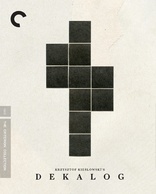Dekalog Blu-ray Movie
HomeDekalog Blu-ray Movie 
The DecalogueCriterion | 1988 | 583 min | Not rated | Sep 27, 2016
Movie rating
8.9 | / 10 |
Blu-ray rating
| Users | 5.0 | |
| Reviewer | 5.0 | |
| Overall | 5.0 |
Overview
Dekalog (1988)
Originally made for Polish television, Dekalog focuses on the residents of a housing complex in late-Communist Poland, whose lives become subtly intertwined as they face emotional dilemmas that are at once deeply personal and universally human. Its ten hour-long films, drawing from the Ten Commandments for thematic inspiration and an overarching structure, grapple deftly with complex moral and existential questions concerning life, death, love, hate, truth, and the passage of time.
Starring: Artur Barcis, Olgierd Lukaszewicz, Olaf Lubaszenko, Piotr Machalica, Jan TesarzDirector: Krzysztof Kieślowski
| Drama | 100% |
| Foreign | 98% |
Specifications
Video
Video codec: MPEG-4 AVC
Video resolution: 1080p
Aspect ratio: 1.33:1
Original aspect ratio: 1.33:1
Audio
Polish: LPCM Mono
Subtitles
English
Discs
Blu-ray Disc
Four-disc set (4 BDs)
Playback
Region A (locked)
Review
Rating summary
| Movie | 5.0 | |
| Video | 4.5 | |
| Audio | 5.0 | |
| Extras | 5.0 | |
| Overall | 5.0 |
Dekalog Blu-ray Movie Review
Reviewed by Dr. Svet Atanasov October 23, 2016Krzysztof Kieslowski's "Dekalog" (1989) arrives on Blu-ray courtesy of Criterion. The supplemental features on the disc include original trailers; "A Short Film About Killing" and "A Short Film About Love"; exclusive new video interviews with cinematographers Wieslaw Zdort and Witold Adamek; archival cast and crew interviews; various archival interviews and programs with Krzysztof Kieslowski; exclusive new video interview with film editor Ewa Smal; and a lot more. The release also arrives with a 72-page illustrated booklet featuring writings on film, archival content, and technical credits. In Polish, with optional English subtitles for the main features. Region-A "locked".
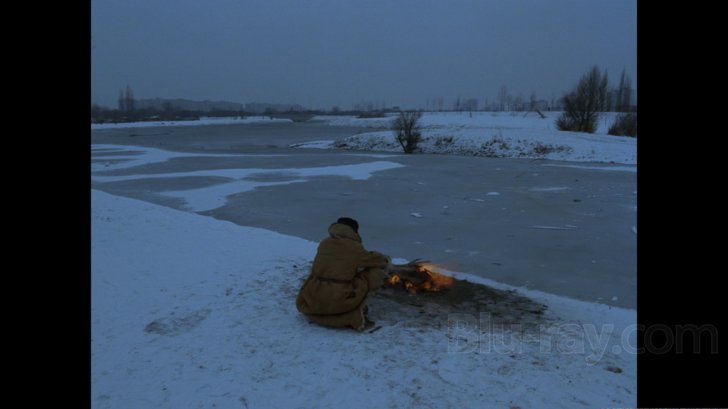
It is a collection of ten short films, each approximately an hour long, each loosely based on one of the Ten Commandments. All ten films were directed by Polish master Krzysztof Kieslowski, but he collaborated with multiple cinematographers.
The films are set in a country that no longer exists. The time is the transitional period during the late 1980s in which Poland struggled to evolve into a democratic state. However, all ten films ignore the political tension in the country and instead focus on its people and their individual struggles to have some sort of a decent life.
The main characters in the films come from the same apartment complex in Warsaw. It is a large area with huge high-rises packed with people from different ages. Some are young and healthy, some are old and sick. Some try to be kind to each other, but there are many who are too tired to be polite and prefer to hide in their invisible shells.
In this borderline surreal environment Kieslowski welcomes the viewer into the private lives of a group of strangers. In the first film a lonely professor is forced to reevaluate his entire system of beliefs after his young son goes missing during a brutally cold winter day. In the second film a woman in her late thirties demands that her neighbor, a prominent doctor, helps her decide if she should stay with her seriously ill husband or choose another man with whom she can soon have a child. In the third film a married man must decide if he is happy with his family or ready to go back to his former lover. In the fourth film a father and his teenage daughter also begin reexamining the strength of their relationship after they make an unusual discovery. An angry drifter makes a terrible decision in the fifth film and then meets an idealistic lawyer who can’t come to terms with the fact that there is nothing that he can do to help him. In the sixth film a young man and his older neighbor meet under some unusual circumstances and learn that being in love can mean a lot of different things. A very young woman and her mother, both with good intentions, confront each other in the seventh film. In the eighth film an elderly professor of ethics is forced to reassess her past when an American visitor enters her classroom. In the ninth film a young and healthy man’s relationship with his wife is put to the test when a doctor reveals to him that soon he will no longer be able to make love to her. And in the final film two brothers with different lifestyles inherit a very valuable collection of stamps that abruptly force them out of their comfort zones and allow them to see the world around them in an entirely new way.
Perhaps the main reason why Dekalog remains enormously effective today is the fact that it does not condemn the political environment in which it emerged. It could have been very easy, but Dekalog does not do it. Instead, it casually captures the rhythm of life in what are essentially the final days of the crumbling communist regime in Poland. And by refusing to focus on the obvious -- the suffocating misery, the hopelessness and widespread despair -- it actually places the viewer right in the middle of this quite bizarre reality and allows it to quickly develop a very intimate relationship with its unique characters.
The Commandments are not clearly identified. Instead, Kieslowski leaves it to the viewer to figure out how they are linked to each film. This is also done intentionally. By doing so the Polish master actually forces the viewer to ponder their relevance in the reality in which the various characters share. (In Poland during the communist regime, the Catholic Church and the Party had a very complex relationship. A lot of people struggled to embrace both and while the country was under the Soviet umbrella the Catholic Church and the Party seriously compromised each other. The Party was of course the dominant force until the formation of Solidarity, the powerful independent labor union led by Lech Wałęsa, which essentially relegitimized the Catholic Church and its public role. In the years after the fall of the communist regime, however, Solidarity was also rocked by scandals that hurt its credibility and eventually collapsed, creating an odd social vacuum that left a lot of ordinary Poles as disillusioned and desperate as the characters from Dekalog. It is why Dekalog remains relevant today).
Two of the ten short films in Dekalog also have extended theatrical versions. They are A Short Film About Killing and A Short Film About Love. In 1988, A Short Film About Killing won the Jury Prize at the Cannes Film Festival and profoundly changed Kieslowski’s career.
Dekalog Blu-ray Movie, Video Quality 
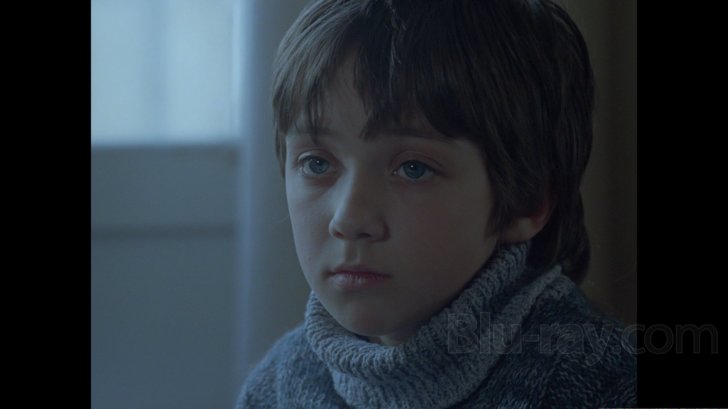
Presented in an aspect ratio of 1.33:1 and approximately 1.70:1, encoded with MPEG-4 AVC and granted 1080p transfers, the ten films in Krzysztof Kieslowski's Dekalog arrive on Blu-ray courtesy of Criterion.
The following text appear inside the booklet provided with this Blu-ray release:
"Approved by the respective cinematographers when possible, this new restoration of Dekalog was undertaken by TVP from scans made in 4K resolution from the 35mm original camera negative. The original monaural soundtracks were remastered from 35mm magnetic tracks and restored by the Criterion Collection using Pro Tools HD and iZotope RX.
The new restorations of A Short Film About Killing and A Short Film About Love were undertaken by Studio Filmowe TOR from scans in 4K resolution from the 35mm original camera negative. The original monaural soundtracks were remastered from 35mm magnetic tracks and restored by the Criterion Collection using Pro Tools HD and iZotope RX.
Transfer supervisors: Witold Adamek, Jacek Blawut, Slawomir Idziak, Andrzej Jaroszewicz, Krzysztof Pakulski, Wieslaw Zdort."
Please note that screencaptures that are included in our review appear in the following order:
1. Dekalog One: Screencaptures #1-3
2. Dekalog Two: Screencaptures #4-6
3. Dekalog Three: Screencaptures #7-9
4. Dekalog Four: Screencaptures #10-12
5. Dekalog Five: Screencapytures #13-15
6. Dekalog Six: Screencaptures #16-18
7. Dekalog Seven: Screencaptures #19-21
8. Dekalog Eight: Screencaptures #22-24
9. Dekalog Nine: Screencaptures #25-27
10. Dekalog Ten: Screencaptures #28-30
11. A Short Film About Killing: #31-34
12. A Short Film About Love: #35-36
Because the short films in Dekalog were lensed by different cinematographers most have drastically different visual qualities. For example, One and Three have very naturalistic appearances while Five has a heavily stylized appearance that reminds of The Double Life of Véronique. Light and shadow, in particular, are captured in a number of different ways that impact overall clarity and definition; elsewhere different ranges of colors are also carefully manipulated. So when viewing these short films one should not expect a great deal of consistency because they have very unique stylistic identities. Grain is visible and well exposed, but there some segments where it appears that some light corrections might have been applied. Contrast levels can also fluctuate a bit while producing some light black crush, though because of the stylistic choices mentioned earlier it could be that they are in fact intended. Colors are solid and for the most part convincing, but there are some segments where I get the feeling that perhaps they could have been balanced slightly better. Once again, however, there are very specific stylistic preferences on display. Image stability is excellent. There are no serious encoding anomalies. I noticed only a short sequence in Two where some blockiness quickly popped up. Overall, this is indeed a very strong presentation pf Dekalog that represents a major upgrade in quality over the old R1 DVD box set from Facets Video.
A Short Film About Killing and A Short Film About Love are given 1080p transfers as well. The basic characteristics of the technical presentations are virtually identical to those of the two short films from Dekalog.
(Note: This is a Region-A "locked" Blu-ray release. Therefore, you must have a native Region-A or Region-Free player in order to access its content).
Dekalog Blu-ray Movie, Audio Quality 
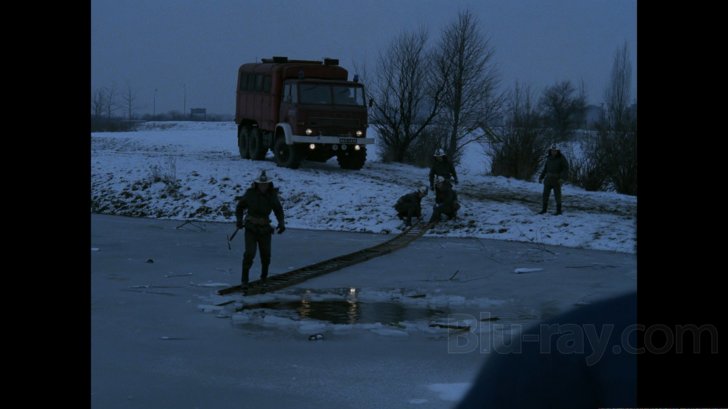
The ten short films in Dekalog come with Polish LPCM 1.0 tracks. Optional English subtitles are provided for every short film.
The quality of the lossless tracks is excellent. Clarity is outstanding and depth is typically as good as one can expect it to be. All of these short films also have very beautiful soundtracks that greatly benefit from the optimized fluidity. The dialog is crystal clear, clean, and always exceptionally easy to follow.
Dekalog Blu-ray Movie, Special Features and Extras 
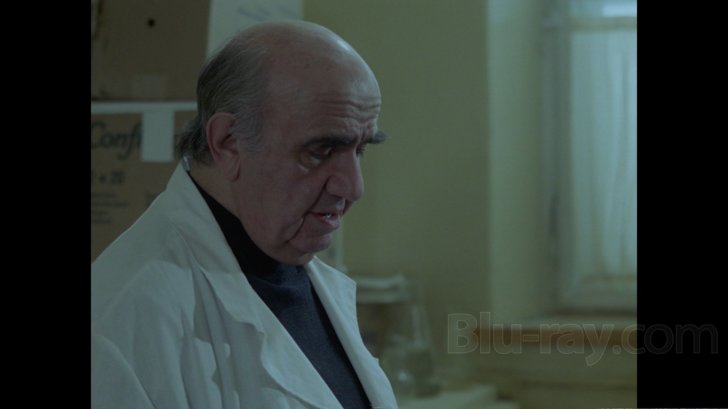
Disc Three
- Trailers - two original trailers for A Short Film About Killing and A Short Film About Love. In Polish, with optional English subtitles. (5 min, 1080i).
- A Short Film About Love (1988) - please see the main review for additional comments. in English, not subtitled. In Polish, with optional English subtitles. (89 min, 1080p).
- A Short Film About Killing (1988) - please see the main review for additional comments. in English, not subtitled. In Polish, with optional English subtitles. (87 min, 1080p).
- Krzysztof Kieslowski -
1. On the Set of Deklog - presented here is an archival interview with Krzysztof Kieslowski which was conducted during the shooting of the second short film from Dekalog. In it the director quickly addresses the main concept behind Dekalog. In Polish, with optional English subtitles. (4 min, 1080p).
2. A Short Film About Dekalog - presented here are excerpts from an archival interview with Krzysztof Kieslowski which was recorded by film students Eileen Anipare and Jason Wood of the University of North London in 1995. In the interview, the director discusses the funding of Dekalog, its marketing, its unique structure and the main ideas that define it, the decision to shoot it with different cinematographers, etc. In Polish, with optional English subtitles. (21 min, 1080i).
3. Kieslowski at the National Film Theatre - presented here are excerpts from an archival audio interview with Krzysztof Kieslowski conducted by film critic Derek Malcolm at the National Film Theatre in London in 1990. In the interview, the director describes Dekalog (some of its unifying themes), and discusses the fact that Dekalog was a TV project but the ten films are not actually TV films, the socio-political environment in Poland at the time and the fact that it was absolutely unbearable, the struggle of ordinary Poles and those of the characters in the films, the critical reception of Dekalog in Poland and abroad, etc. In English and Polish, with live translation. (24 min, 1080p).
- Annette Insdorf - in this new featurette, professor Annette Insdorf discusses the cinematic storytelling in Dekalog, the various socio-cultural overtones in the films, some unique lensing choices, Krzysztof Kieslowski's attitude towards religion and spirituality and the importance of both in Dekalog and his body of work, etc. The featurette was produced exclusively for Criterion in 2016. In English, not subtitled. (28 min, 1080p).
- Cast and Crew Interviews -
1. Krzysztof Piesiewicz - in this archival video interview, screenwriter Krzysztof Piesiewicz discusses the narrative structure of Dekalog and each film's intent to ask questions rather than provide answers, some of the main themes and symbolism in the films, and his interaction with Krzysztof Kieslowski. The interview was conducted for the Polish home video release of Dekalog in 2003. In Polish, with optional English subtitles. (26 min, 1080i).
2. Thirteen Actors - in this archival video interview, thirteen actors that appeared in Dekalog recall their work with Krzysztof Kieslowski during the shooting process as well as some of their initial impressions of the stories and the unique themes they incorporated. The interview was conducted for the Polish home video release of Dekalog in 2003. In Polish, with optional English subtitles. (22 min, 1080i).
3. Ewa Smal - in this brand new video interview, film editor Ewa Smal discusses her apparently slightly tense relationship with Krzysztof Kieslowski during the editing of Dekalog, the visual style of the films (with some very interesting comments about the use of close-ups), the premise of the script in the beginning, the final version of Dekalog, etc. The interview was conducted exclusively for Criterion in 2016. In Polish, with optional English subtitles. (16 min, 1080p).
4. Wieslaw Zdort - in this brad new video interview, cinematographer Wieslaw Zdort discusses some popular myths and truths about Krzysztof Kieslowski, his interaction with the director during the shooting of Dekalog, some unique color and lighting choices, some changes that were made while shooting was in progress, etc. The interview was conducted exclusively for Criterion in 2016. In Polish, with optional English subtitles. (16 min, 1080p).
5. Slawomir Idziak - in this archival video interview, cinematographer Slawomir Idziak recalls how he became involved with Dekalog and quickly addresses some interesting stylistic choices he made during the shooting process. The interview was conducted for the Polish home video release of Dekalog in 2003. In Polish, with optional English subtitles. (3 min, 1080i).
6. Witold Adamek - in this brand new video interview, cinematographer Witold Adamek recalls his first contact with Krzysztof Kieslowski and their work on A Short Film About Love as well as some interesting decisions the two made while shooting the feature film and the short film together. (There are some very good comments about the two films and the differences between them). The interview was conducted exclusively for Criterion in 2016. In Polish, with optional English subtitles. (13 min, 1080p).
- Hanna Krall - in this brand new video interview, Hanna Krall, a creative confidante of Krzysztof Kieslowski, discusses her relationship with the director and his working methods, how the original concepts for some of his films came to exist (Blind Chance), the production history of Dekalog, etc. The interview was conducted exclusively for Criterion in 2016. In Polish, with optional English subtitles. (16 min, 1080p).
- Booklet - a 72-page illustrated booklet featuring:
- "And So On": Kieslowski's Dekalog and the Metaphysics of the Everyday by Paul Coates.
- The Films
- Credits and Casts
- Capsules by Paul Coates
- Kieslowski on Kieslowski
- On Dekalog
- On A Short Film About Killing
- On A Short Film About Love
- Technical Credits
Dekalog Blu-ray Movie, Overall Score and Recommendation 
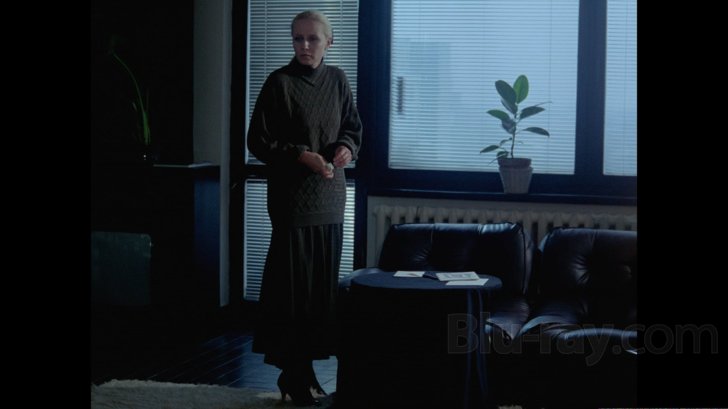
Polish master Krzysztof Kieslowski's Dekalog is rightfully regarded as one of cinema's greatest masterpieces. It is a deeply poetic and incredibly beautifully filmed project that in many ways seems even more relevant in these incredibly cynical times that we are currently enduring. Dekalog has been restored in 4K and arrives on Blu-ray with a tremendous selection of new and archival bonus features. So far, it is one of the year's very best releases. VERY HIGHLY RECOMMENDED.
Similar titles
Similar titles you might also like

Three Colors: Red 4K
Trois couleurs: Rouge
1994

Blind Chance
Przypadek
1987

Yi Yi
一一
2000

Three Colors: White 4K
Trois couleurs: Blanc
1994

Stalker
Сталкер
1979

Three Colors: Blue 4K
Trois couleurs: Bleu
1993

A Ship to India
Skepp till Indialand / A Ship Bound for India
1947

Persona
1966

A Brighter Summer Day
牯嶺街少年殺人事件
1991

Apur Sansar 4K
অপুর সংসার / The World of Apu
1959

Aparajito 4K
অপরাজিত / The Unvanquished
1956

Pather Panchali 4K
পথের পাঁচালী / Song of the Little Road
1955

Cries and Whispers
Viskningar och rop
1972

Wild Strawberries
Smultronstället
1957

Fanny and Alexander
Fanny och Alexander
1982

Andrei Rublev
Андрей Рублёв / Andrey Rublev
1966

Jeanne Dielman, 23, quai du Commerce, 1080 Bruxelles
1975

Sawdust and Tinsel
Gycklarnas afton
1953

Brink of Life
Nära livet
1958

Dreams
Kvinnodröm
1955
